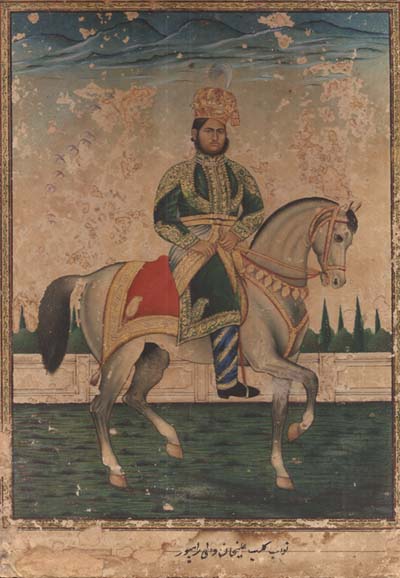FWP:
SETS == WORDPLAY
The wordplay that energizes the verse-- to the mild extent that it can be said to be energized at all-- is of course that of ʿalī and ʿālī .
Grammatically, it could just as well (or even better) be Ghalib who is on the proud, prancing steed. But of course in a constrained, well-behaved verse like this we know it's the patron.
To the patron himself, Navab Ali Bahadur, Ghalib wrote (in Persian) to recommend the study of Mir and Mirza [Sauda] as well as various Persian poets, and added the passage cited in the letter above. Although he deprecates his own Urdu poetry, it's also clear from this letter that Ghalib is considerably proud of his Urdu ghazals (he recommends them as models for the Navab to study and imitate).
This verse, with its overt and specific flattery of a patron, makes an intriguing follow-up to {99,9} with its implied disparagement of all patrons.
Aristocrats often commissioned portraits of themselves on horseback; here's an example showing Ghalib's last patron, Navab Kalb-e Ali Khan of Rampur (r.1865-87):

Ghalib:
[to Navab Ali Bahadur, in Persian:] I speak the truth in hope that men will credit it.... For the writing of Urdu verse I have long felt no inclination. I write in Persian, but since it is the pleasure of His Majesty the Shadow of God [=the Emperor Bahadur Shah] that I should from time to time bring verse of this kind as a gift into his exalted presence, I perforce write now and then in Urdu too. Thus I enclose in this letter of humble submission a few recent ghazals ... which I have copied out. Be pleased to study them, and set your heart on winning for your pen this style of writing, and for your song this kind of melody.
== Russell and Islam, p. 94